- Home
- G. Wells Taylor
When Graveyards Yawn ta-1 Page 7
When Graveyards Yawn ta-1 Read online
Page 7
After the appearance of the walking dead, earth experienced the Great Stillbirth. Every pregnant mammal spontaneously aborted and seemed to be unable to conceive again. The same process was later found to affect birds, most fish and reptiles. Their eggs or offspring were not viable. Meat was expensive now; it was worth its weight in gold. And so, none but the rich could afford to eat irreplaceable cows-not even cloning would work-and the price skyrocketed. Eating real meat had become a fond memory to the average Joe. There were always rumors of a calf being born, or a lamb; but science discounted this as obvious hoaxes or mass hallucinations created by the remnants of a meat eating culture. As a result meat had been replaced in the diet with a vitamin-enriched paste of seaweed and plankton that could be spiced, formed and colored to order. When I ordered hotdogs I was really ordering plankton and seaweed dogs. They weren't bad with mustard and onions-let's say they weren't worse.
Also driving the price of meat and farm produce was the change in the temperament of animals. It became apparent that they were not going to tolerate associating with human beings anymore. The first hint that I had found was a news story written six months into the Change of a Chilean farmer and his family being eaten by pigs. This was followed by other reports. In Wisconsin a family dog killed its owners while they slept. An old woman in Brooklyn had her eyes torn out by her fifteen-year-old cat. A flock of ravens ripped a Brazilian postman to shreds. Then the big one, Lazy Lodge, a retirement village in Florida catering to Canadian retirees fell silent one Saturday evening. Alerted by panicking relatives, police investigated the following day and were ambushed by over one hundred alligators. It was so bad the army was eventually called in to mop things up. Investigators determined that the slaughter occurred the previous evening when the sixty-two victims had congregated in the recreation room for a dinner dance. The evidence was plain: the animals had acted together.
As the reports escalated, so did the governmental response. Initial recommendations concerning pet and livestock control soon became orders for all out extermination. Since animals were also affected by the animate death, this was a difficult process. Many animal lovers, often missing fingers and hands by the end of their action, whisked the creatures away and freed them in the countryside. This practice when linked with the wild animal populations already out of control soon made the countryside unsafe, and there began a general exodus to the cities.
I finished my breakfast then good-morninged Elmo where I found him sitting motionless in my office. He was entranced by his umpteenth sunrise. Odd, because the eternal cloud cover allowed only a gradual lightening of the constant gray.
"Tell me, Elmo," I asked, skirting the desk and flopping into my chair. "Don't you ever get bored?"
He shifted uneasily for a few moments, with embarrassment. While he rummaged through his opinion box, I busied myself with makeup and mirror. Wasn't I the prettiest little clown?
"Well, Boss, it's strange being d-dead. Least ways it's sometimes strange." He searched for a cigarette, found one, lit it. "There are days when it's almost fun, you feel like you cheated death-like you're n-never gonna have to take the big step over-I used to be religious…and some ideas is-are-hard to shake. Then there's other times being dead is like being in line at a bank in the summer. The air conditioning's broke down, there's a hundred people in front of you and someone's slit your wrists. Times like that you know that death has cheated you." He fell silent.
I paused in the middle of drawing on my right eye. "Jesus, Elmo, that doesn't sound any different from being alive."
He nodded. "I said it's s-strange." Elmo's head dropped, as though saddened. "Most days I'd like to r-ride a roller coaster."
"That explains your driving," I laughed and smudged my left eye. "One day, we'll drive down the coast to Vicetown-see what we can see. You know, Elmo that's what we need: a vacation."
Elmo pointed a lifeless finger. "That's what it's like being dead."
I grinned, pulled out the office bottle. "How about we pickle ourselves instead."
Elmo laughed with a sound like crumpling cellophane. I poured two drinks and Elmo took one. He said it sometimes made him feel numb, and it kept his guts clean. I kicked my feet up then grabbed the phone and started dialing the number that was closed on Sunday.
"Time, Elmo?"
He looked at his watch. "Nine-thirty."
Over the line, I heard a tiny rattling sound like a tin cup full of stones at the bottom of a well-another bad connection.
Mrs. Caffeine answered in person this time. "Hello, Mr. Adrian's office, Lori speaking," she said this in one syllable.
"Hi Lori," I said. "I was killed recently and would be interested in seeing what services you have to offer."
"Well, sir, you should phone the business office. Mr. Adrian is far too busy to handle clients personally. One of our New Life Hosts would be pleased to speak to you if you would call…"
"It's rather urgent." I cut her off. "I was given this number by a friend. I'm Gingold the Sublime. You might have heard of me, a mime. You see my death involved a corrosive substance, and I'm afraid of what a delay might do to my remains." I tried to introduce an artsy trill to my voice since I tended to talk out the back of my head.
"I understand, sir," the receptionist said after a pause. "But this is not the business office. For appointments…"
I cut her off. "I was told by my friend, Jan Van Reydner, to ask for Simon. She said I'd get a little better treatment."
There was an eerie pause. "Just a moment." She was gone. In her place was a recording of some joker on a panpipe. She was back before I became suicidal. "Mr. Gingold, you may come in at five o'clock. A New Life Host will be here to greet you. Do you know where we're located?"
"I've got your card," I said, thanked her for her help and hung up. I turned to Elmo.
"You're not gonna be happy about this…"
Chapter 14
I headed west along the elevated highway. Elmo had elected to stay behind to man the phone. I had been pretty sure he would. If crossing the Landfill was not a treat for the living, it was a nightmare for the dead. The day was gray, like every day in Greasetown. It was also its usual cool, damp, and smelly. The perpetual cloud seemed to hold in every belch of exhaust, every breath of collective halitosis. The highway was practically empty. Since the Change, a drive in the country had lost its appeal. I looked at my watch-four-thirty. It had rained hard six times already. The wipers squeaked and droned. The road rose on pedestals forty feet above the rolling countryside. It stood as monument to the inevitably recurring shortsightedness of humanity. I chuckled in reverie.
As the dead had started showing up on unemployment lines, at banks and bars the scientists had rushed to study the phenomena. They couldn't find any sensible reason for anything, but they could at least weigh and measure, describe cause and effect. The dead retained their personalities and most of their senses depending on a simple equation of gray matter. Basically, they were dead people with the same desires and needs as the living-as long as they retained the minimum amounts of brain tissue. It didn't even have to be good brain tissue, dried, pulverized or pureed would do. Not scientific, but it was something.
Ignoring all the scientific queries it begged the obvious question: What happened if a dead person didn't have enough gray matter left? The eerie landscape below me was the answer. I knew that if I pulled the car over, and peered down, I might chance to see strange hulking shapes and body fragments lumbering, crawling or slithering through the shadows. Authority had tried the landfill idea with the dismembered and decapitated bodies that started showing up in a progressively violent world. It soon became obvious that those in power didn't have a clear idea of life or death after the Change, because Authority Internment Facilities were crawling with pitiful dead people parts after only a few years. Since animals were similarly affected their remains also joined the undulating mass.
Add to that the wild wolves, coyotes and packs of feral dogs, living and dead, tha
t terrorized the landscape, it became too dangerous to keep the Internment Facilities clean. Dead tissue, once carefully buried, was now dumped with less ceremony than garbage once received. Decent folks complained about the hellish scene the countryside had become, and Authority reacted by building walls around cities and constructing a network of elevated highways connecting them. Everything else was left to the wild and the dead.
Like most of the cities that remained, Greasetown was insulated around its inland perimeter by a thirty-foot tall barrier. This allowed the good citizens to worry about their own doomed existence without the distraction of thinking about the great living graveyard growing at their backs. The Landfill was rumored to be a haven for Authority fugitives and groups of reassembled bandits. Rumored among the dead was the tale that these lands held hope and promise for the future. One day a call would come, and they would go.
I understood that these lands held the future for the human race. It was simple enough to me. We would all end up there someday-sooner or later. Another one of the perks that came with the Change was that the living didn't grow old. Or if they did, it was at a rate too slow to be detected. Scientists-fast becoming the brunt of most jokes-couldn't explain that either. Staying alive meant apparent immortality, but sooner or later, the longer you lived, the better the chances of dying a violent death. Then came the ignoble end-the shambling, withered fragments of a once proud species. I sighed. Thoughts like these were inevitable while crossing the Landfill. That's why I always traveled over it with a bottle of whiskey clamped between my legs. Visions of undead lungs howling at the moon danced in my head.
I pulled on the whiskey and let the hot bite in my throat burn my mind onto different tracks. If this Simon fellow was at the treatment center he would know that someone knew something about Jan Van Reydner. Mr. Adrian, as president, was not likely taking calls for Simon, so I was pretty sure he was the same man. I'd soon see. In preparation for my role as Gingold the Sublime, the dead mime, I had smeared gray makeup onto my hands until they were sufficiently ghoulish. I had also done my best to introduce curlicue crispness to my clown makeup-an understated nuance of the 'avant-garde'. It screamed Paris; it screamed France.
At four forty-five, I pulled off the highway onto an elevated track that ran into an opening in a huge stone wall. This surrounded a gigantic black stone mansion that rose on a natural granite promontory many stories into the cloudy sky. I supposed the wall was to keep peace and quiet in and the discord of the dead out. I listened for the howl of the wolf.
Beside a pair of great iron doors was a parking area. I pulled to a stop. Far below me, I knew that gray, twitching worm-shapes inched their way around the base of the wall. I shuddered against such macabre unreality. My hair tried to stand on end. I felt Tommy's psyche titter wildly. I let my ears roam over the silence until they fixed upon a distant clicking, whispering sound, like a surgeon's hand in viscera. I took another snort of whiskey, and fumbled for my cigarettes. Imagination was not always an asset.
The iron doors before me opened suddenly. A long black truck, windowless, except for a slit in its bulbous nose, drove silently by on solid rubber wheels. It reminded me of the old super chief trains I had seen in pictures. The truck picked up speed and left me alone at the closing gates. I imagined the happy dead customers inside, all pink-cheeked and fresh from the Simpson special treatment. Once home they'd begin their regiment of self-maintenance to wait for the madness that would come for them. I could understand the lack of windows. It just would not do to expose clients to the sights of the Landfill. Insanity would arrive without prompting. I felt a chill go through me as I contemplated the reason Simpson's was located in such a neighborhood.
I slipped my gun into the glove compartment and got out of the car-then began my dead man act. It wasn't hard; I just stiffened my muscles and moved mechanically, and tried to blink slowly and methodically. Watching Elmo every day did more than remind me of my mortality.
There was a brass panel marked 'guests' fixed with a large red button. I pressed the button, while crushing my cigarette beneath my heel. I felt eyes looking at me. Set in the enormous gates was a people-sized door that popped open automatically. I walked in wondering what could cause such corporate paranoia, as to build these formidable gates. I doubted it was fear of Landfillers. Competition was stiff in the death business.
I entered and was met by a tall, thin man in a black uniform. His jacket had a high martial collar. A white with red-trim shirt blazed underneath. He smiled with pink lips that were puckered pining for mother's breast. I was amazed at his youthfulness. The skin on his peanut-shaped face looked soft, and seemed to be covered by a light down. I tried to register nothing in my face.
"I'm Gingold the Sublime." I kept my voice flat.
"I am Tobias, welcome to Simpson's Skin Tanning and Preservation for the Deceased, Mr. Gingold." He smiled with small pearly teeth. I smelled formaldehyde on his breath and pronounced him dead. Simpson's did a real job if Mr. Tobias was an example of their work.
"I'm sorry I came in makeup, but…" I put fingers to my cheek. "My complexion underneath is so-well, disfigured."
He nodded, smiled sweetly under a Peter Pan nose, and then laughed with cherubic vigor. "Oh, I understand-I understand. I was in such a state myself when I first stepped over into my new life. Have no fear. Please, try to relax. You've come to the right place." He gestured to a small, motorized cart. "If you please, the courtyard is enormous. I'll take you to your New Life Host."
"Thank you," I said and followed him to the vehicle. We crossed a walled enclosure that housed fountains, gabled gazebos and wandering pathways over grass and garden. I wondered how they managed to keep the flowers in bloom. There was plenty of water, but no sun, and with the walls, the courtyard was that much darker. As I sat beside him I felt a pang for a cigarette-I wasn't sure if it was me or Tommy.
The mansion piled into the sky before us, castle-like with minarets and towers. Lights glowed in many windows, the occasional spectral shadow passed behind curtains. I growled silently, looking at it all. Finally business had found a perfect niche. Death created a steady supply and demand.
Chapter 15
I was shown through an elaborate lobby and lounge decorated with a thousand carved angels. Blood-red Persian carpeting covered many hundred square feet of floor and stair. Great leather couches and chairs held quaint positions under potted palm, or by the roaring fireplace you could park a truck in. At the foot of ornately carved columns, corpses reclined in wheeled divans and chairs-a few had books or magazines. Some were bandaged from head to toe; all had a thoroughly antiseptic smell about them. There was also the distinct aroma of money. Tobias led me past three dead people engrossed in a discussion about religion and up a broad staircase with gilt banister-then to a huge set of doors.
Embossed in the brass was an elaborate reproduction of Bruegel's, The Triumph of Death. I wasn't an art expert. This particular painting had become the rage since the Change. In it, people ran, terrified, through a scene not unlike my image of the Landfill. Mobs of skeletal demons performed imaginative butchery upon the living-a hanging here, a decapitation there, here a skull, there a skull-everywhere a skull-skull. Everyone died in the picture, peasant, businessman, saint and king. No matter where the people ran, they died-none with dignity worth mentioning. Briefly, I imagined a figure in a clown's greasepaint dancing gleefully through the carnage. Tommy grew excited inside me. I felt his erection press the canvas of my coveralls.
"Beautiful," Tobias whispered when he saw my attention upon the doors. He fluttered hooded eyes. "Mr. Adrian is a collector of rare art. He had that made from the original." He gestured to the doors. "Morbid to the timid living, perhaps, but there is no shame in death; and, we are all aware of the denial that life is." He pushed lightly upon the doors and they swung silently open.
"Mr. Adrian's office." He bowed slightly sending a shock of black hair over his brow.
I left him and entered the room. Its corn
ers were lost to me in black shadows. I followed a tender glow from ceiling lamps until I saw the shape of a man behind a huge desk. It grew out of the darkness like an oil tanker. It was so big he would have to walk to the ashtray. I stood for a moment in feigned awe and studied Mr. Adrian in the soft light.
His head gleamed slightly over a synthetic tan. Hair curled in golden ringlets from an exposed crown. He looked at me with sharp blue eyes that were set close to a large nose. His shoulders were square and as he smoked, thick arms flexed beneath his trim-cut jacket. He wore dark green-odd-because everyone else I had seen who worked in the place was in black from head to toe.
"Have a seat, please." He sketched a line in the air with cigar smoke. As I pressed my buttocks against the thick leather cushion, I noticed a familiar aroma. Adrian started talking.
"I don't know who you are, or the purpose behind that ridiculous makeup; but I've been in this business long enough to know a dead man when I see one. You're not dead and because you lied about that, I assume you're not really Mr. Gingold."
"And you're not Simon," I said, trying to figure out how to play the scene. "Mind if I smoke? I couldn't help but notice the scent of your cigar. Expensive?" I lit a cigarette and watched its smoke dance on my hand like a cobra. It swayed slowly.
"Not really, Dutch, Henry Winterman Cafe Cream Mild. I'm growing impatient." He seemed to have perfect control of his voice. He added just enough volume and emphasis to make it as much a threat as if he held a gun in his hand.
"Wildclown," I drawled, slowly puffing smoke in an effort to seem in control. "I'm a private detective."
"And the purpose behind that ludicrous outfit?"
"Detective disguise number 118. The dead mime costume, I'm surprised no one has used it on you yet."
"Don't be flippant, Mr. Wildclown. You'll find I'm not predisposed to humor. I have friends with certain authority." He smiled as he said "authority." I began to feel like a rat in a barbecue.

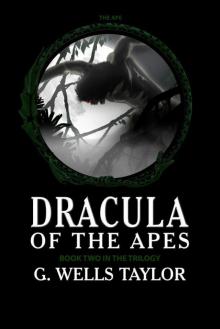 Dracula of the Apes 2
Dracula of the Apes 2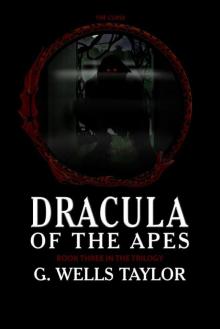 Dracula of the Apes 3
Dracula of the Apes 3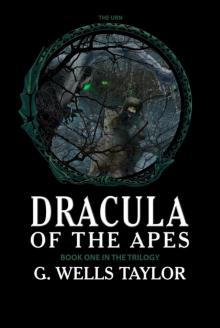 The Urn
The Urn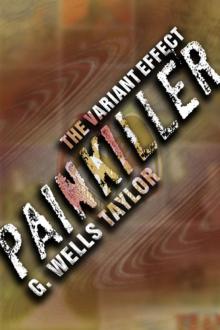 Painkiller
Painkiller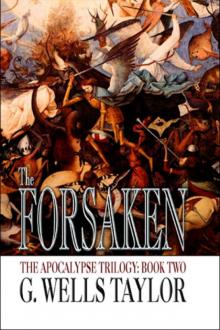 The Forsaken - The Apocalypse Trilogy: Book Two
The Forsaken - The Apocalypse Trilogy: Book Two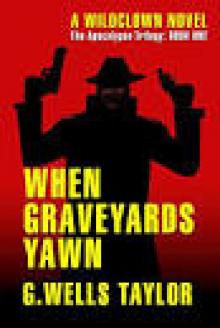 When Graveyards Yawn
When Graveyards Yawn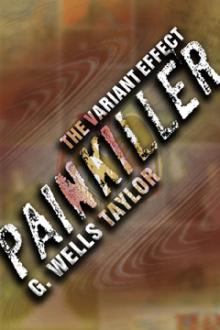 The Variant Effect: PAINKILLER
The Variant Effect: PAINKILLER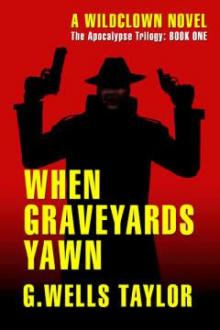 When Graveyards Yawn ta-1
When Graveyards Yawn ta-1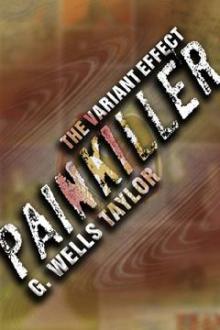 Painkiller tve-2
Painkiller tve-2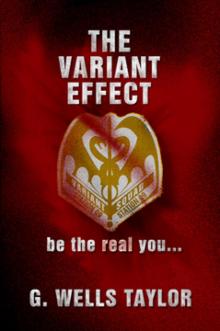 The Variant Effect
The Variant Effect